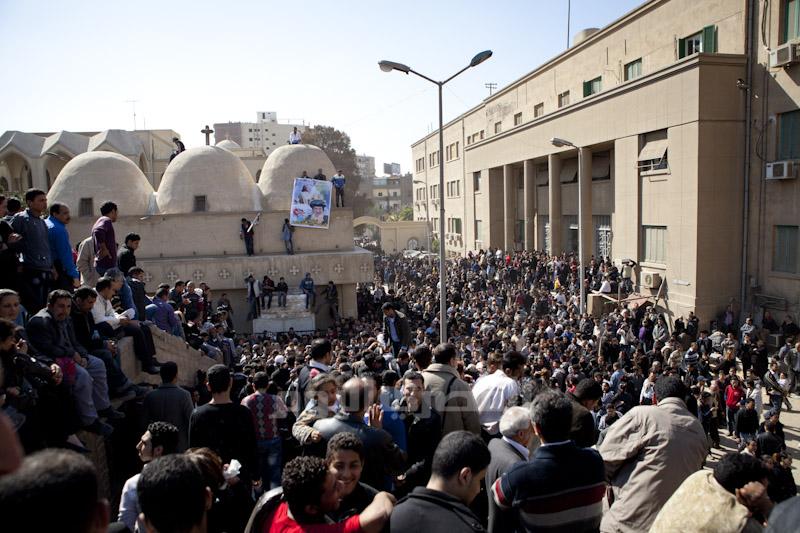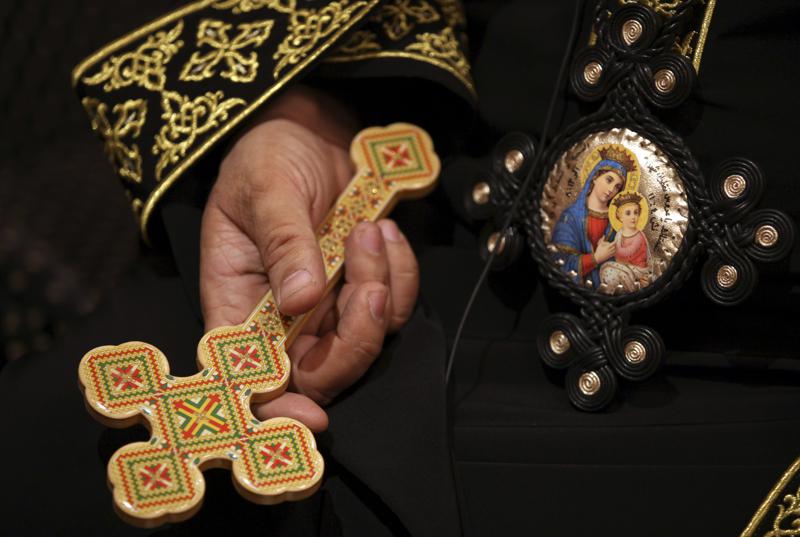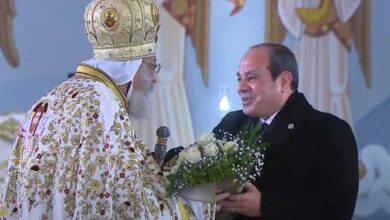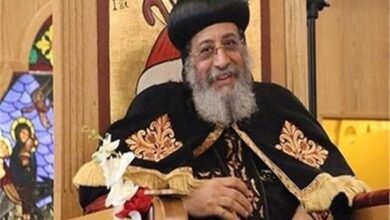
Egypt's Coptic Orthodox Church could finally change internal familial by-laws, which currently forbid Egyptian Coptic Christians from divorcing or remarrying, after increasing pressure from members within the community. Some members also adovate changing by-laws regulating papal elections, which were put in place in the 2012 election of incumbent Pope Tawadros II.
The recent approval of new regulations by the church’s Holy Synod indicates the organization could also be nearing more pressing societal changes.
The new change in the by-laws represents an enforcement of Article 3 of the 2014 Constitution that is related to several provisions governing the relation between Christians, the Church and the state. The article stipulates the principles of Christianity and Judaism as the reference of legislations organizing personal and religious issues of Egyptian Copts and Jews, as well as the selection of spiritual leaders.
In a previous phone-in with CBC satellite channel, the pope revealed that a draft law approved by the three Egyptian churches for the first time in 34 years had not been handled by legislators yet. The question now is whether that draft would resolve, or further complicate the church’s most serious dilemma.
Tawadros had pointed to a legislative panel formed by the presidency that would review a set of proposed legislation, with the church’s draft on the agenda.
Personal status laws under fire
The personal status laws, or the church laws regulating marriage, have been under debate since 1971, when Tawadros II’s predecessor, late Pope Shenouda III, set forth a papal decree that changed the law so a divorce or second marriage would only be allowed in the case of adultry.
Prior to 1971, the old church laws gave nine conditions that permitted a Christian to divorce. These by-laws were first approved by the church in 1938 and then replaced by civilian courts, issuing a 1955 law that used the prior regulation as reference.
The decree resembled the start of a clash between the state’s and the church’s rules, with many affected Copts lost in the middle. The crisis exacerbated for many who won divorce rulings that the church does not recognize, prompting them to resort to the judiciary to obtain a permission for a second marriage denied by the pope. Accusations, especially from Islamist hardliners, flow against the church, labelling it a state within the state for its rejection of judicial rulings.
Attempting to maneuver around the loophole, the church, without informing the Justice Ministry or awaiting for approval from the People’s Assembly, amended the 1955 law applied by the courts of law to comply with its decisions. The move aroused controversies around the church’s stance and how it illegally acted as a legislator.
The church had a conviction that the state does not have the authority to decide on those amendments. Pope Shenouda III had given the state two options: either to approve the amendments or enforce the draft unified law.
That gets us back to the same question: would the church pass the unified law again acting in its constitutional capacity as the sole legislator for Christians? And does that unified law offer solutions to the soaring problems?
The “unified law”, which sets adultery as the only acceptable reason for divorce, had been given that name since it was adopted collectively by all Christian denominations and submitted to authorities in 1979 for final approval. Yet, the draft has been frozen since then. It was claimed then that the delay was due to the assassination of late president Mohamed Anwar al-Sadat, which remains unconvincing given that it remained on the shelves for decades under former president Hosni Mubarak.
Samir Tanagho, an expert in non-Muslim personal status laws, said the draft was difficult to adopt since it contained a number of provisions at odds with Islamic Sharia, especially in issues related to adoption, paternity and inheritance.
Unless the draft the church intends to submit in the next period involves reconsideration of the old law, the problem is destined to complicate the issue further. So, would the church resolve its problems single-handedly making use of its constitutional right? And does the state maintain a hands-off position or instead enforce civil laws that would come to the aid of aggrieved Christians?
Regulation on Papal Elections
The Holy Synod, declaring in 20 February 2014 a new regulation for the election of the church’s head, was practically replacing the regulation in place since 1957, widely unfavored by the common Copts for excluding the election rights to specific classes. Demands arose after the death of former Pope Shenouda III in 2012 to amend the election law, but the caretaker pope, Bishop Pachomius, feared the then Islamist-dominated parliament would not approve proposals for a new regulation, which, he thought, would elongate the church’s transition.
Back then, the church was witnessing internal conflicts on more than one front, and was under the influence of a number of bishops who enjoyed a wide network of relationships with the state. Coptic youth, driven by the 2011 uprising’s enthusiasm, demanded the change to extend to the church. Though the church decided to run the 2012 elections based on the old rules, Pachomius obtained written pledges from the three finalist candidates to change the electoral law within the first year of his papacy.
The new regulation seeks to enforce Article 3 of the 2014 Constitution, but the provision is surrounded by various interpretations. Some church leaders believe the article gives them alone the right to lay down legislation governing Christians. Another opinion adopts the Supreme Constitutional Court’s interpretation of the constitution’s second article, which sets principles of Islamic Sharia as the main source of legislation. That opinion believes that Article 2 addresses the legislative authority rather than religious ones, and that the same understanding could be applied in interpreting the article concerned with Christian legislation.
The church, scurrying to submit its draft to the presidency-formed panel, is obviously preferring to approach the president rather than waiting for the election of a parliament yet of unknown orientations. In his study “Democracy of the Clergy,” Ishak Ibrahim, a researcher at the Egyptian Initiative for Personal Rights (EIPR), quoted church sources as saying that the church submitted its law to former interim president Adly Mansour in May, but the presidency, unexpectedly, returned the draft back to the church for further review of provisions deemed at odds with the constitution.
Since the regulation determines the methodology of the pope’s selection, it, therefore, defines the relations between Copts and their church on one side, and relations between the church and the state on the other side. That makes the papal elections an issue for interest for all Christians, not only for the clergymen. The method by which the pope is elected guarantees the church’s independence from superior interventions. That poses the question whether the new by-law would ensure that independence and whether the religious leadership took a democratic track towards its adoption.
EIPR’s Ishak Ibrahim believes the news statute preserves the spirit on the old by-law, rendering the elections a sham. In his study, Ibrahim argues that the process of the draft’s formulation failed to take varying opinions into account, excluding the making of the final draft to the Holy Synod.
Church strife over democracy
The Coptic Orthodox Church has never known a state-sanctioned by-law for papal elections before the 20th century. When Late Khedive Saeed marked a shift in the relations between Copts by sparing them the payment of tributes, allowing them to enroll in military service and enacting laws regulating their personal and religious matters, the conflict between the clergymen and secularists broke out over the administration of church affairs.
After the death of Pope Demetrius II, the papal seat remained vacant for more than four years due to delay from the government in ordering the selection of a successor. Later, Pope Kyrillos V was elected. The pope disbanded the church’s Denominational Council believing its authorities surpassed his own. His decision was opposed by then Justice Minister and MP Botrous Ghali who demanded council members to be elected. The elections did take place, but after the end of Ghali’s parliament stint, the pope refused to hold the polls, telling the government that the council violated church rules and traditions, which prompted the government to strip control over the council. But he was later reinstated after agreement over the council’s formation had been achieved.
Following Kyrllios V’s death, tensions heightened between the educated, progressive Coptic elite and conservative clergymen. The standoff worsened when each side elected its own pope, before the pope named by the reformist current stepped down to prevent division.
Demands for a papal election law persisted. In 1942, a royal decree adopted a new regulation, resulting in the election of Anba Macarius, who enjoyed support from the Denominational Council and the reformists. Renewed internal disagreements, however, were followed by the induction of Anba Yusab who vowed to restore the council’s powers. But problems surged when a group calling itself the “Coptic Nation” abducted the pope and held him at a monastery. The pope, was reinstated and again removed before his death in 1956. A tripartite committee was formed to run the church.
The Papal office, again, remained vacant for three years under late president Gamal Abdel Nasser. In 1957, the current by-law was enacted, reducing the number of voters from several thousands to 662, including 223 clergymen; the rest were civilians picked up by bishops.
Edited translation from Al-Masry Al-Youm




